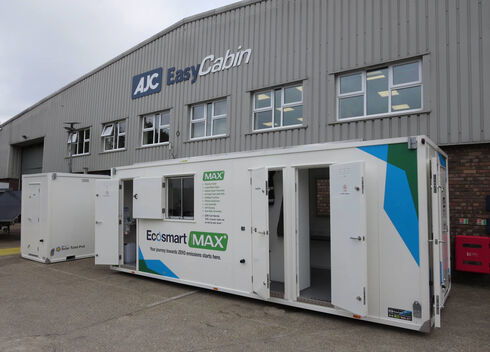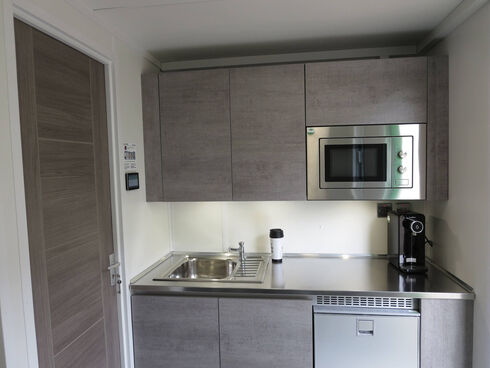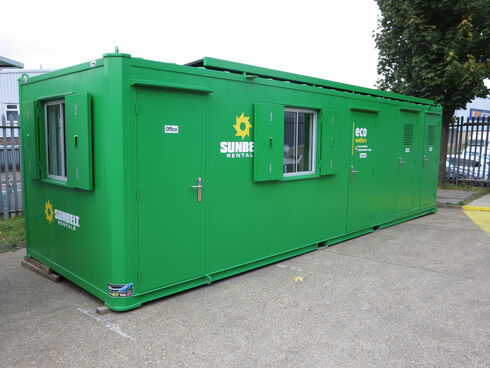
Evolution at AJC
11 December 2023

Next year, AJC celebrates the 60th anniversary of its original business and its story is one of steady evolution, in terms of both constantly adapting its products as customer requirements change and creating specialist operations to serve emerging markets.
The company’s origins date back to 1964 when engineer Albert James Carey was asked to build a towable baggage trailer. Its success inspired him to set up AJC Trailers in Houghton Regis, near Luton, to build them at scale and new models soon followed for camping, transportation and mobile catering.
Albert’s grandson Jav Samsa joined the business in the late 1990s as an apprentice engineer and eventually became Managing Director, the position he still holds.
Steady expansion necessitated a move to the current Luton site in 2006.
To serve an emerging market, AJC manufactured its first welfare unit in 2014 and AJC EasyCabin was established. Over the last five years or so the welfare units have incorporated more environmentally friendly characteristics to meet growing market needs including solar, battery, wind and hybrid technology, and this led to the creation last year of AJC Power Solutions – whose operation was discussed in another blog post recently.
The total operation now employs around 100 people and AJC undertakes every aspect of cabin manufacture at its Luton factory, except galvanising the chassis. Business Development Director Mark Samuel told me that cabins are offered in 12ft, 16ft, 20ft ans 22.9ft sizes, the last mentioned being the largest that can be towed legally in the UK.
The company now makes all the wall panels in-house, an exacting operation in which composite panels are bonded and compressed. These are sprayed in the paint shop at the Luton factory. External corners are protected by galvanised edge strips.
A display in an area outside the AJC premises, called the Innovation Village, includes key welfare products such as the Eco Smart Solar MAX mobile unit (pictured above) that has roof-mounted solar panels charging a battery to provide power. An onboard HVO-compatible generator kicks in if necessary to meet demand spikes, although AJC says that for most of the time the unit will be able to run on battery power alone.
Instead of a power-hungry kettle, the EcoSmart Solar MAX has a one-shot hot water dispenser which draws just 33W instead of 3000W. Similarly the drying area has a 600W dehumidifier rather than a 2000W heater. This reduces running costs and lowers the user’s carbon footprint.
Rainwater harvesting is incorporated, with water being captured in a gulley between the solar panels and fed into a tank with filters. An additional UV treatment unit renders this water drinkable, says AJC.
An EcoSmart Zero unit is also available with a hydrogen fuel cell instead of the 3.5kVA generator.
As previously reported on the blog, AJC EasyCabin has also developed a high-specification model for the specialist hirer InfraFleet, namely the e-Smart 22, a 22.9ft welfare unit accommodating up to 16 people. The initiative recently won Gold in the Green Apple awards from The Green Organisation.
Also on display at the Innovation Village when I visited was a static welfare unit demonstrating the high quality of the standard interior finish. This includes contoured doors, stylish worktops and cupboards, USB charging points at every table. Again, roof-mounted solar panels are incorporated to charge the onboard battery, with a generator as backup. The most popular static models are 24ft and 28ft, the latter having two WCs.
The Solar Toilet Pod has lighting and a pedal-flush WC powered by a solar panel and a battery with an LPG boiler for hot water. Mark Samuel says that the unit has proved extremely popular over the past year.
Handling all production aspects in-house, AJC EasyCabin can respond to bespoke needs. When I toured the Luton factory, the production lines included cabins fitted out as stand-alone domestic kitchens that can be connected to a residential power supply.
These are being produced for situations where homeowners are recovering from flood or storm damage and include everything from an oven and washing machine, to a fridge and a microwave. Two doors are incorporated in case the unit has to abut a wall.
AJC’s story is certainly one of ongoing success and a great testament to British innovation and manufacture. And as its prepares to celebrate its 60th anniversary, I understand that there are further product developments in the pipeline.
Photos: Alan Guthrie



